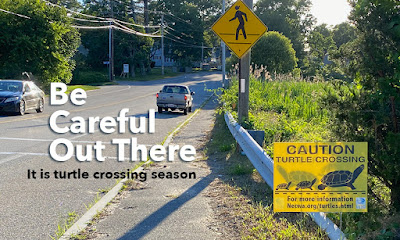Why turtles cross the road — and what you can do to help them
By Joshua Perry, 2022 NECWA Intern
Wareham, MA. June 27, 2022 — On the morning of June 14, three diamondback terrapins were struck and killed by cars while crossing the Weweantic Bridge, the busy Route 6 thoroughfare linking the towns of Wareham and Marion. A concerned motorist, Mike Maurer from Marion, managed to save a fourth terrapin and notified NECWA of the other fatalities.
It was a shocking tragedy and a clear sign that terrapins and other turtles are in grave danger on our roads. The Weweantic Bridge is a known hotspot for these accidents: nearby terrapins come ashore looking to nest and are funneled on to it, ending up in the middle of mid-morning traffic. NECWA is working with local and state authorities to find a solution to this problem and to increase awareness of the bridge’s safety issues.
The reality is that adult female terrapins are running out of options when it comes time to nest each year. Urban encroachment, coastal armoring, and rising sea levels are eroding their available nesting area on both sides, and their little remaining terrestrial habitat is crisscrossed by dangerous roads. These females have to find a good place to lay their eggs, and they’ll go the distance to do it — even if it means putting their lives at risk. Turtles often cross busy roads during the late spring and early summer of nesting season, and it’s our responsibility to keep an eye out for these scaly pedestrians in an attempt to minimize fatalities. Terrapins live long lives, reproduce slowly, and suffer from high hatchling mortality rates. Because of this, the death of a reproductively mature female can do lasting harm to the future of a local population.
Anytime you see a turtle on or near a road, please call NECWA’s hot-line at 508-566-0009 for advice and assistance. If the situation is safe for you, move the turtle off the road in the direction it was heading. Never lift the turtle by the tail: this can injure their spine, which is fused to the top of their shell.
If you find an injured turtle, call NECWA for assistance or take it to a local wildlife rehabilitation center (see list below). If the animal is dead, you should also give us a call — NECWA can remove the carcass from the road, collect identifying information about the turtle, and record when and where it was hit.
YOU can help keep your local turtles safe! Stay on the lookout, and check out some more resources here:
- Mid-Atlantic Turtle and Tortoise Society: Helping Turtles Cross Roads
- YouTube: Video on Safely Moving a Snapping Turtle Across the Road
- Turtle Rescue League: Turtle In The Road – What Should I Do?
- The Orianne Society: Why Turtles Cross Roads and How to Help





Comments
Post a Comment